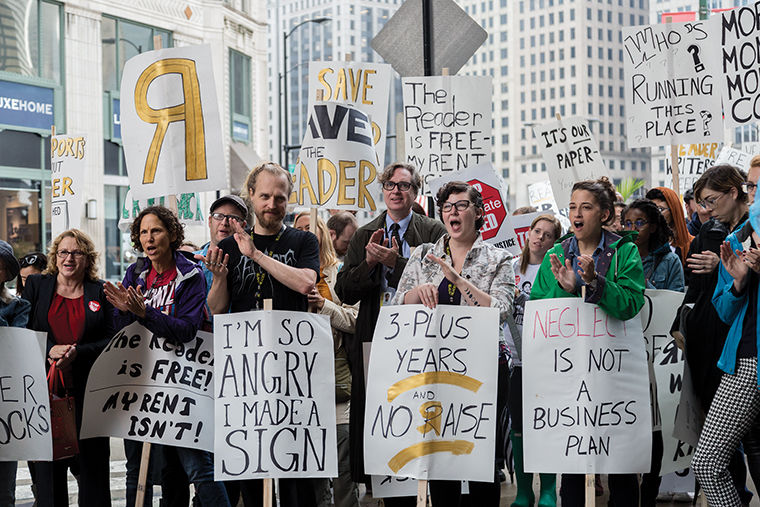‘Chicago can’t afford to lose the Reader’—Chicago’s alt-weekly rallies support, places pressure on owners
October 10, 2016
Huddled under the Chicago Sun-Times building and confined to a small bit of sidewalk, hundreds of Chicagoans gathered Oct. 6, rallying to save the Chicago Reader, proving the iconic paper is not going anywhere if support remains strong.
Chicago’s long-running alternative weekly newspaper has been facing monetary and staff cutbacks since Wrapports, LLC bought the paper in 2012, as reported May 2 by The Chronicle.
The Chicago News Guild, a labor union of media employees, teamed with the Chicago Federation of Labor and other unions at 350 N. Orleans Ave. as an intensified step in fighting for the paper’s future.
“I’ve been reading the Reader since I learned how to read,” joked former Illinois Governor Pat Quinn, who spoke at the rally. “Having great writers and people who help those writers put out an edition every week is an important institution in our city.”
The Chicago News Guild started a petition April 21 addressing the Reader’s survival. The “Save the Chicago Reader” campaign, which currently has 6,900 signatures, asks Bruce Sagan, owner of the company, to invest in the Reader by granting staff higher wages.
The rally showed Chicago that the Reader is an invaluable source to the city, according to Robert Reiter, Jr., secretary and treasurer of the Chicago Federation of Labor, who opened the hour-long rally with an energetic spirit. It attracted aldermen, union supporters and journalists, all emphasizing the Reader’s importance to the city.
“That information you convey to literally millions of people is vital if we are going to have a strong democracy,” Quinn said. “We cannot allow the plutocrats to break unions and break the opportunity to work hard and get a decent wage.”
Reiter echoed these sentiments, painting a picture of the effect wealthy business owners have on journalism.
“They shrunk it, neglected it, and what has that given us? Donald Trump,” Reiter said. “It gave us a society that doesn’t rely on information and facts to make decisions.”
Alderman Brendan Reilly (42nd Ward), who represents the downtown area, said the paper is part of the community’s social fabric. He criticized the lack of a wage increase in 10 years, calling it “criminal.”
“Chicago cannot afford to lose the Reader,” Reilly said. “The Chicago Reader is as much Chicago as the Cubs or the White Sox.”
Alderman Carlos Ramirez-Rosa (35th Ward) expressed his support to the crowd for the paper and the journalism it presents. He reminded the audience that Chicago is a union town, and it was here that the labor union started.
“[Journalism] is there to hold the politicians, the government and the rich and powerful accountable,” Ramirez-Rosa said.
The Reader, which began publishing in 1971, is a staple of Chicago’s political and culture scene, publishing stories by award-winning veteran writers such as Ben Joravsky, who was spoken about reverently by each speaker at the rally, including local aldermen and the news guild’s organizer Dave Roeder.
Alderman Ameya Pawar (47th Ward) remembered Joravsky as the only reporter who gave him attention in 2011 when he was running for alderman, campaigning door to door with no budget.
“Now I hope to return the favor—I stand with you in solidarity,” Pawar said, addressing the passionate crowd of supporters.
Joravsky said it was gratifying to hear the impact he has made on the city and Chicago politics throughout his 25-year career at the Reader.
“I was so moved by them coming out and saying nice things about me, even though I have knocked all of them,” Joravsky said.
Reader reporter Aimee Levitt, who made signs for the rally that read “three years and no raise,” also thanked the crowd for support and added that most of the staff needs to freelance to make ends meet.
“We all continue to work here because we believe in the journalism the Reader does,” Levitt said. “We wish management believed in us and our work as much as we do.”
Jim Kirk, editor-in-chief of the Sun-Times, said in an April 25 emailed statement that the company continues to negotiate with The Reader employees in good faith. However, according to J.R. Jones, film editor at the Reader who has been on staff for 19 years, the Reader gave Wrapports a printed copy of the petition but did not hear back from the company.
The rally’s goal was mainly to cause noise to reach the offices of Wrapports on the 10th floor.
“Their response was to pretend it was not happening,” Jones said. “[They are] trying to ignore us.”
Supporters made it clear they would not let this happen. Many voiced compelling reasons why the Reader is special to them. Sam Halloway, of Local 2 firefighters union, was there to support the Reader and his fellow union cohorts as well as Joravsky, his neighbor and friend.
“If I want to know what is happening today, I’ll look in the Sun-Times or the Tribune, but if I want to know why it’s happening, I’m going to look to the Chicago Reader,” Halloway said.








